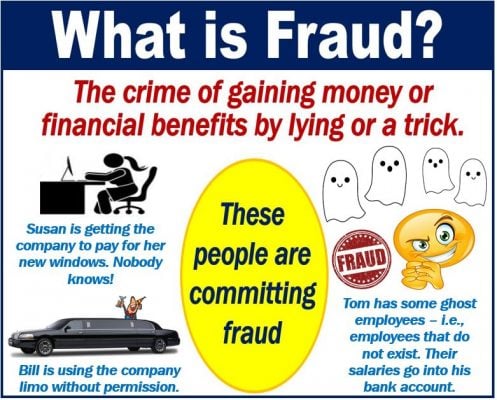What is fraud? Definition and examples
Fraud happens when a person gains something of value, in most cases money or property, illegally. They gain something of value from a victim by deceiving that person. In other words, the perpetrator knowingly makes a misrepresentation of a matter of fact.
We call somebody who engages in fraudulent activity a fraudster. Fraudsters commit ‘white-collar’ crime, i.e., crimes in an office setting. White-collar work contrast with manual or blue-collar work.
When somebody pretends to be something they are not, we call them a fraud. For example, Tony goes to the veteran’s get-together every year. He reminisces with other veterans about, for example, the Vietnam war. However, Tony has never served in the military. He is not a veteran. He is a fraud.
OxfordDictionaries.com has the following definitions of the term:
“1. Wrongful or criminal deception intended to result in financial or personal gain. 2. A person or thing intended to deceive others, typically by unjustifiably claiming or being credited with accomplishments or qualities.”

Origin of the word ‘fraud’
The word emerged in the English language in the middle of the fourteenth century. It came from the Old French word Fraude, which meant ‘deception.’
The Old French word came from the Latin word Frauden (nominative fraus), which meant ‘deceit, a cheating’ of persons, ‘a cheater, deceiver’ of uncertain origin.
Etymonline.com adds:
“Connections have been proposed to Sanskrit Dhruti, which meant ‘deception, error.'”
In the 1650s, the English term also began to mean ‘something intended to deceive, a fraudulent production.
It was not until the 1850s that it also meant ‘humbug, pretender, deceiver, impostor.’
Fraud is a noun, not a verb
Unlike other words, such as scam or con, the word fraud is only a noun. It is never a verb.
Con or scam, on the other hand, are verbs or nouns.
I can say (verb) “They conned me out of my life savings,” or (noun)“That was a sophisticated con; many people fell for it.”
An uncountable noun
Some nouns are countable while others are uncountable. For example, I can count bananas. In other words, I can say “One banana, two bananas, three bananas, etc.” Therefore, ‘banana’ is a countable noun.
However, I cannot count ‘air.’ I cannot say “One air, two airs, three airs, etc.” Therefore, ‘air’ is an uncountable noun.
Fraud is an uncountable noun. Con and scam, on the other hand, are countable nouns. Look at the difference in how we use the three words below:
– He committed fraud.
– They performed a scam.
– She carried out a con.
Before ‘fraud’ there is no article (‘a‘), but there is one before ‘con’ and ‘scam.’ I can only place ‘a‘ beforehand when ‘fraud’ refers to somebody who pretends, i.e., someone who is a fake.
We can often use fraud, con, and scam interchangeably. However, scam and con have narrower meanings and tend to describe less serious crimes. Scams do not typically last a long time, neither do cons. Fraud might include short- or long-term illegal activities.
Corporate fraud
Corporate fraud includes any fraudulent activity against a business.
Some cases of corporate fraud are extremely complex and highly secretive. When the fraudster or fraudsters are discovered, it is a huge scandal with serious repercussions for many stakeholders.
MyAccountingCourse.com says the following regarding corporate fraud:
“Typical cases of corporate fraud are complex, highly secretive, and if discovered involve economic scandals or evasions of financial responsibilities.”
Often, the fraudsters initially have no long-term plan. They just want to do that one ‘job,’ get their money and never do it again. However, either they get greedy or trapped in a never-ending series of additional ‘jobs’ to keep people from finding out what they have done.
In some cases, somebody or a group of people may have been engaged in fraudulent activities in their company for several years before they are caught.
Below are some examples of corporate fraud:
Ghost employees
Somebody who works in payroll creates fake employees and pays them. However, their salaries go directly to the fraudster’s bank account.
Personal purchases
Somebody who works in a company can divert money to purchase goods on his or her own behalf. That person needs to be able to approve the supplier invoices or their own expense reports. Alternatively, the person may have an accomplice who gets the documentation approved.
Skimming
Before anybody has recorded money coming in, the fraudster intercepts it. To do this, they need to be allowed to both record accounting transactions and open the mail.
Unauthorized use
If I drive a company car or limo for my own personal use without authorization, I am committing fraud.

